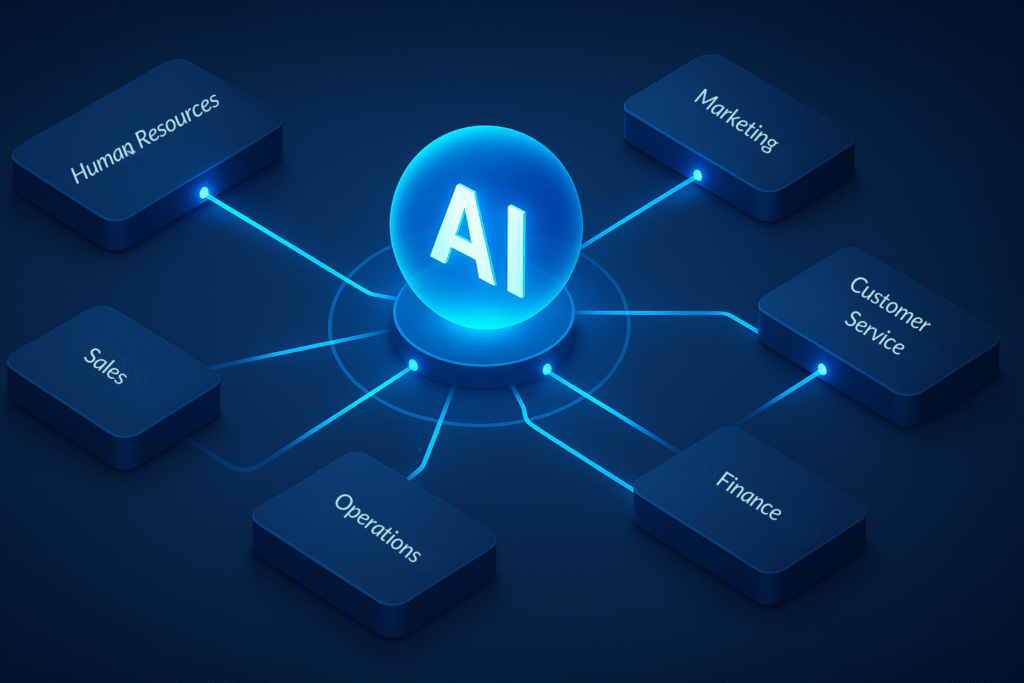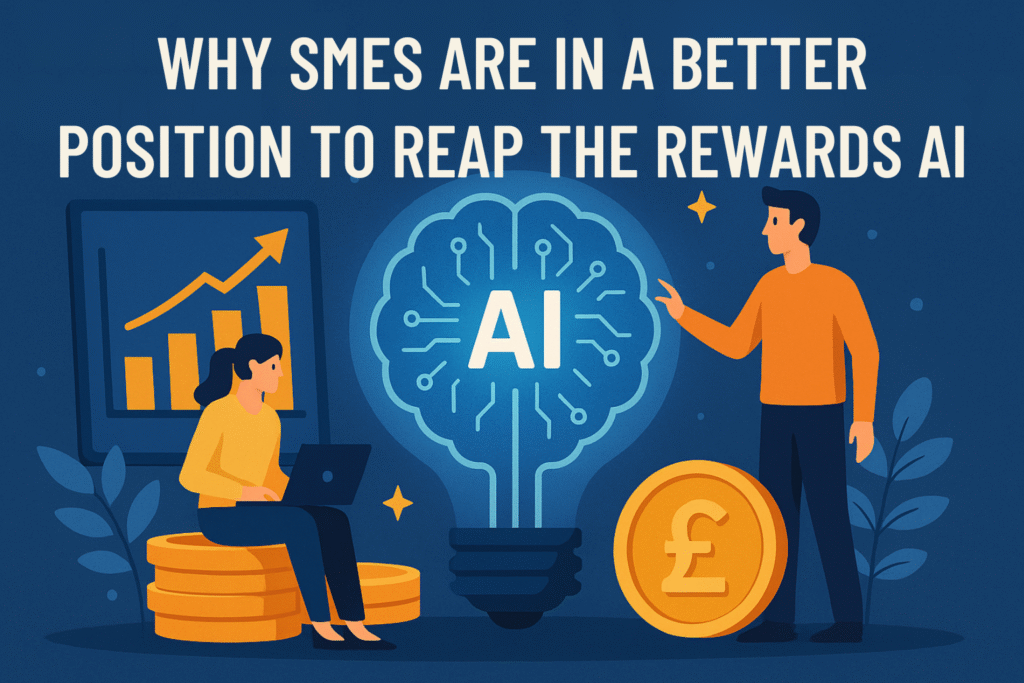There’s a lot of noise around AI these days. Big corporations displaying their multi-million-pound digital transformation strategies and buzzwords fly around like confetti. But when we really get down to it, smaller businesses are often in a better position to make AI work for them, and not just in a theoretical way. In fact, we’d argue that SMEs can adapt faster, test smarter, and integrate more meaningfully than most of the big players out there.
This isn’t coming from an hour long online training or some books recommended by the latest AI influencer. This is coming from my real life, every day experience running our own AI systems and building out tools with a small but mighty team. We’ve been breaking and fixing things, fine-tuning them, paying a fortune for GPU’s and Servers and learning every step of the way.
With all that said, here’s why I think SMEs are sitting on a golden opportunity when it comes to AI, and what to do with it.
1. Small Data, Smarter Testing, Faster Results
AI doesn’t need massive data lakes to work. In fact, when you’re trying to fine-tune something like a customer support agent or a recommendation system, smaller datasets are a real advantage.
With a lean data set, you can test fast, adjust quickly, and measure results with much more control. When we were training our own internal agent (HAMI), we started small, just our technical documentation. We won’t lie and say it was a success straight out the door. The first responses were a mixed bag. Some were spot on while others showed us how imaginative the AI hallucinations can be.
But bit by bit, we refined it (and continue to do so. Just don’t ask Graeme how his RAG is doing, it’s a sore topic). We added FAQs, user queries from our CRM, how-to questions from clients. With every tweak, we improved accuracy, and that’s the point: in a smaller company, you can do this kind of iterative testing with minimal fuss on minimal data sets.

2. Agility Beats Bureaucracy
Big companies have big processes. And departments. And eternal reviews. And a security team. And legal. And Politics. And Egos…and the list goes on. It’s a ten-step sign-off process just to get an API connected.
SMEs don’t have that headache. If you decide to integrate AI into your business processes, it doesn’t take a year of meetings and budget approvals. You can jump straight in. Within just a few weeks you can experiment, tweak, and implement. Just like that.
Need your CRM to chat with your email? Want to test an AI bot on your website? Want to create an AI agent that talks to your data? Go for it. In our case, we were able to build and test agents directly inside our systems without waiting on layers of approval. That freedom to act and try is all that you need to get started. It allows you to fail forward and succeed faster.
3. Cross-Team Knowledge Makes AI More Powerful
One thing I’ve observed in smaller businesses is that people wear more hats. You might have someone who handles both sales and support. Or someone who manages operations but also dips into tech. That overlap is exactly what makes AI implementation easier.
Why? Because identifying where AI can help starts with understanding the problem, and in SMEs, people often know the fuller picture. They can say, “This admin task slows us down every week,” or “we always forget to follow up on this kind of enquiry.” The End Users are a lot closer to the ‘Management’ in SME’s and often Managers will know themselves where specific problems lie.
Big businesses tend to silo their knowledge. SMEs on the other hand thrive from collaboration and shared understanding, meaning problems are spotted sooner and practical solutions can be implemented straight away.

4. Training Your Team to Be AI-Ready
Something that is often overlooked: it’s much easier to upskill a small team.
Give your staff the freedom to explore safe, low-risk AI tools – platforms like Microsoft Designer, Canva Magic Write, Mistral, or ChatGPT (with clear local policies in place) are great starting points. This kind of hands-on experimentation builds both confidence and curiosity.
Just remember -security is key. Before diving in, check out our AI security hacks to keep your team and data safe. By building AI skills in-house, you’re not dependent on external consultants to make progress. You’re developing internal AI awareness, the first step toward real transformation.
From there, companies like ours can come in and help fine-tune AI into your processes, building custom agents to take on real tasks – customer service, data extraction, onboarding, etc.
Then comes the final stage—fully integrated, end-to-end systems where everything talks to everything else. Your business flows smoother, faster, and smarter, with AI embedded at its core. Want to see how we’ve done it? Check out our EIIƎ page.

5. Better Systems, Less Mess
Many large enterprises are sitting on piles of messy, half-understood data. I’ve worked with it myself: duplicated records, half-filled fields, bits of structured and unstructured nonsense all tangled together. You’re lucky to even get access to the data to verify it, never mind fix it.
SMEs? You’ve more likely to have cleaner systems, and fewer of them. When it comes to AI, that is a gift. You’re not trying to integrate 14 legacy platforms and 300,000 records from five different eras. You’ve got a tighter grip on your data, and that means better AI outcomes with less fuss.
6. Integrated Systems > Standalone Agents
Lots of companies are throwing money at standalone AI tools. A bot here, a dashboard there, maybe a voice agent over there. Don’t get me wrong, those tools might be doing the trick for the business in the moment, but if they don’t talk to each other, you’re just not getting the full picture. You’re missing the advantages of one integrated system that could increase efficiency and optimise your processes.
What we’ve learned is this: the real power comes when you connect your AI tools into a proper flow. One system hand off to the next. Sales speaks to operations. Customer feedback feeds straight into support. Knowledge doesn’t get lost, it travels.
That’s how you cut waste, save time, and help your team actually enjoy their jobs again with less administrative tasks in play. SMEs can do this far more easily than a giant corporate machine.

Final Thoughts
SMEs have the upper hand, but only if they seize the moment.
Start small. Encourage your team to experiment (safely). Get to grips with how AI could ease your daily pain points. Establish what could be simplified, standardised, streamlined and finally systemised. Then look to fine-tune, automate, and eventually build out an integrated platform that lets your business scale with AI built within, not bolted on as an afterthought.
The reality is that in five years’ time, the businesses that started small and smart will be the ones leading the charg. They’ll be leaner, faster, and more adaptive than the rest. They might become the big enterprises to de-throne the previous big players.
If you’re ready to get started and find yourself in need of help along the way, you know where to find us. Call me…Maybe!





